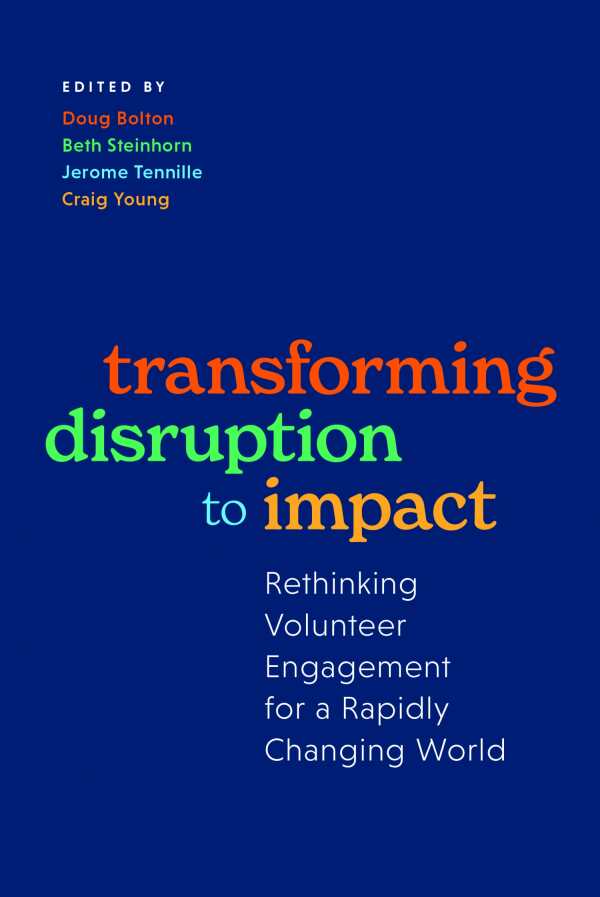Transforming Disruption to Impact
Rethinking Volunteer Engagement for a Rapidly Changing World
These sobering essays reveal how movements to address racial injustice and other inequities faltered during the pandemic era.
The essays of Transforming Disruption to Impact concern the ripple effects of COVID-19 on volunteering and racial justice movements.
This book suggests that the onset of COVID-19 halted volunteer engagement in domestic and international operations as people were pulled from their stations to prevent the spread of the virus. Thus, volunteer organizations were forced to rethink their outreach and sustainability methods in an online, socially distanced world. Written at a time when preexisting racial injustice and inadequate communication structures were coming to the fore, these articles discuss COVID-19’s impact on volunteering as a signpost to “diverse pathways to the future.”
The articles reveal that institutions felt trepidation during the pandemic that deepened preexisting cracks in their organizations. Stereotypes about white saviorism—with volunteers being white and those in need being people of color—were perpetuated. The nuances of this paradigm are the subject of several of the book’s articles. Other entries advertise their organizations, too, repeating mission statements and discussing statistics about how COVID-19 disrupted volunteering. They discuss taking action in terms of overcommunication via responsive efforts like newsletter emails, placing into question which organizations are most up to the task of dealing with the fallout of COVID-19.
But other entries also discuss the pros and cons of volunteering and volunteer organizations. One claims that co-generational volunteering can break down intergenerational barriers, as between someone who went by they/them pronouns and took testosterone, and an older cis woman at AmeriCorps. The impact of COVID-19 on older adults and people of color is a specific concern throughout, since older people are said to be less internet-savvy and communities of color had less access to WiFi and vaccines. These insights elucidate the multifaceted angles through which volunteer organizations persevere, accounting for issues like ageism, LGBTQ+ discrimination, and racial injustice in the aftermath of George Floyd’s murder.
The book notes that, as demand for volunteering increased in 2020, fewer people were willing to volunteer out of fear, placing pressure on volunteer organizations to sustain income and act with diversity in mind. At the same time, it says, corporations had to adopt core values endorsed by consumers in a more technological world, amassing power for the people.
A stark distinction is drawn between corporate and informal volunteering, the latter of which may come in the form of protests and marches, including the Black Lives Matter movement. Multiple essayists encourage the audience to break down existing stereotypes, noting that communities of color were hit the hardest by COVID-19. One essay outlines a plan through which diversity can become a reality by valuing volunteering for its own sake rather than profit, a two-way exchange of skill, and long-lasting community partnerships. Other contributors argue that an increase in empathy is necessary, not just more involvement, and criticize corporate volunteerism in favor of informal volunteering.
The social science and business articles compiled in Transforming Disruption to Impact assess the challenges that volunteer organizations faced during the COVID-19 pandemic.
Reviewed by
Ali Ortiz
Disclosure: This article is not an endorsement, but a review. The publisher of this book provided free copies of the book and paid a small fee to have their book reviewed by a professional reviewer. Foreword Reviews and Clarion Reviews make no guarantee that the publisher will receive a positive review. Foreword Magazine, Inc. is disclosing this in accordance with the Federal Trade Commission’s 16 CFR, Part 255.

